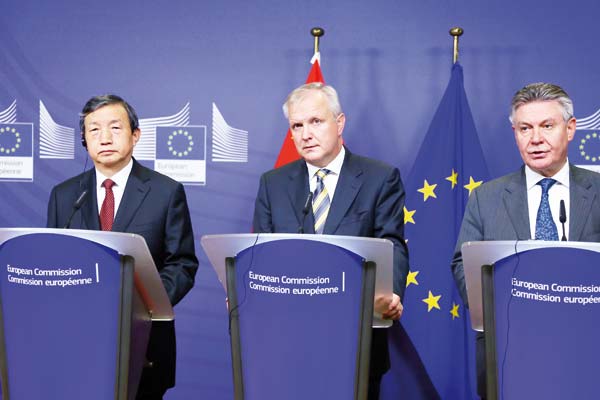EU, China heading in the right direction
 0 Comment(s)
0 Comment(s) Print
Print E-mail China Daily, November 18, 2013
E-mail China Daily, November 18, 2013
|
|
|
Chinese Vice-Premier Ma Kai (left), Vice-President of the European Commission in charge of Economic and Monetary Affairs Olli Rehn (center), and European Commissioner for Trade, Karel De Gucht, during a news conference at the European Commission headquarters in Brussels, Belgium, on Oct 24. [China Daily] |
Although strategic partnerships will be the main focus of the China-EU summit that begins on Nov 21 in Beijing, expectations are rife that the two sides will eventually sign an investment agreement that aims among other things to reduce simmering trade tensions.
According to experts, this China-EU summit is of "special importance" because it will set the tone for future bilateral engagements. Free trade negotiations between China and the EU had not made much progress in the past, because Brussels has yet to grant market economy status to Beijing.
From a European perspective, the current summit is also a rare opportunity to study and observe the new Chinese leadership, especially after the just-concluded Third Plenary Session of the 18th CPC Central Committee.
"I hope this summit is more of a consolidation effort and less of conflict," says Glyn Ford, a five-times former member of the European Parliament. "The European side will be getting to know the new Chinese leadership at close quarters and there will be incremental, rather than radical, moves in political and economic relations."
The two sides are expected to discuss trade and investment, human rights, innovation, urbanization, rule of law, people-to-people exchanges and defense and security at the meeting. Discussions will also center on respective domestic situations and other major global issues such as G20 cooperation.
Jonathan Holslag, a researcher at the Brussels Institute of Contemporary China Studies, says that although the upcoming summit, the highest political dialogue platform since 1998, is of importance, nothing new seems to be on the horizon.
"The main objective is to get acquainted with the new leadership in China and to probe its priorities toward Europe," Holslag says.
Holslag says it is clear that China considers good relations with Europe a top priority. "Trade relations have normalized somewhat, but it remains to be seen whether the investment treaty will signal a new era in economic partnership," he says.
Bernard Dewit, president of the Brussels-based Belgian-Chinese Chamber of Commerce, says the summit illustrates the need for dialogue between the two sides, especially as the economies are becoming more interdependent.
Beyond the investment agreement negotiations, Dewit hopes that both sides will agree on the feasibility studies for a free trade agreement. The FTA is expected to help Chinese and European companies to invest in and access each other's markets.
"The new Chinese leadership is clearly willing to reinforce the EU-China strategic leadership and has recognized the importance of the EU in the global economy," Dewit says. "On the other hand, the EU is also serious about deepening its political and economic ties with China."
Christopher Dent, professor of East Asia's International Political Economy at the University of Leeds in the UK, says that future Sino-EU ties will hinge on closely inter-related issues such as energy, resources and climate change.
"Both sides face stiff challenges on these fronts, challenges that will only become more critically important over time," Dent says.
"China and Europe are championing the global efforts on green energy and other sustainable technologies. There is immense scope for cooperation between the two sides," Dent from the University of Leeds says.
The China-EU summit this year is one of several political gatherings between Beijing and major global powers since the new Chinese leadership took power. Since its inception in 1998, most of the annual China-EU summits have taken place in the second half of the year.
However, trade tensions over solar panels since last September have clouded bilateral relations between the two sides.
"Brussels has a love-hate mindset toward Beijing," says former parliamentarian Ford. "The ups and downs of China-EU relations during the past decade have occurred because of the EU's love-hate mindset toward China."
Experts say that although there was a honeymoon period after bilateral ties began in 2003, there is still reluctance in Brussels to end the arms embargo on China. Other major irritants included Brussels' defensive measures against Chinese textile exports in 2005 and the latest anti-dumping and anti-subsidy investigations against China's solar panels.
Holslag from the Brussels Institute, however, feels that both China and Europe are responsible for letting the partnership become one of process rather than progress.
"The good thing is that both sides have recognized that it is not the quantity of dialogue, but the strength of the partnership that matters in global affairs," Holslag says.
"I am not certain whether this will lead to overall improvement, but I can only hope that we start by building a relationship that is strategic and more balanced."







Go to Forum >>0 Comment(s)